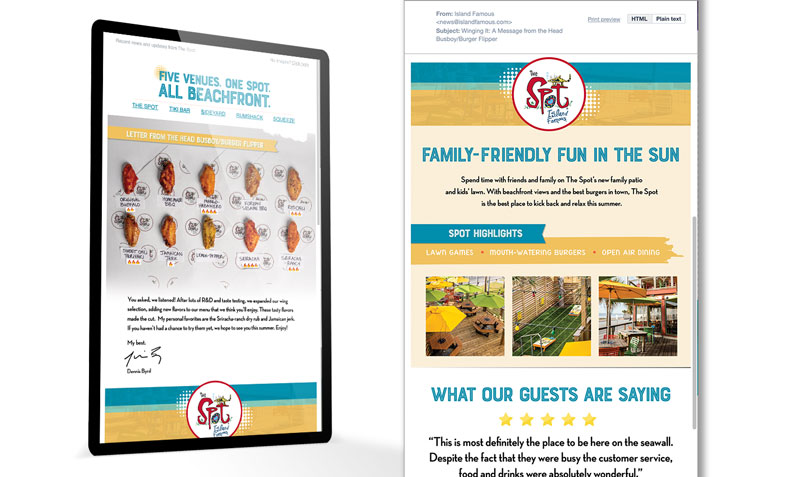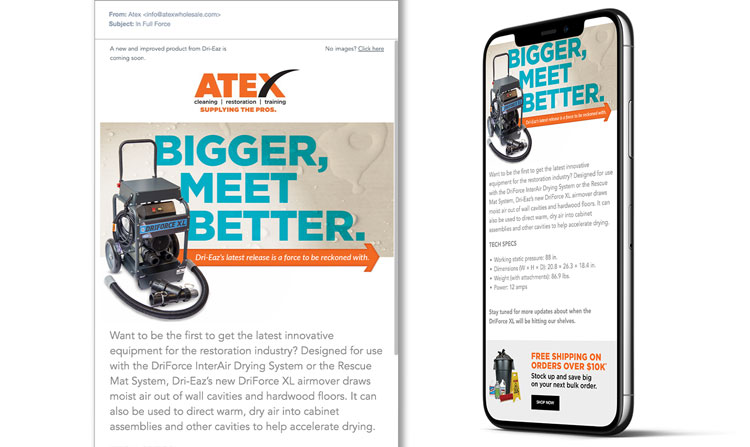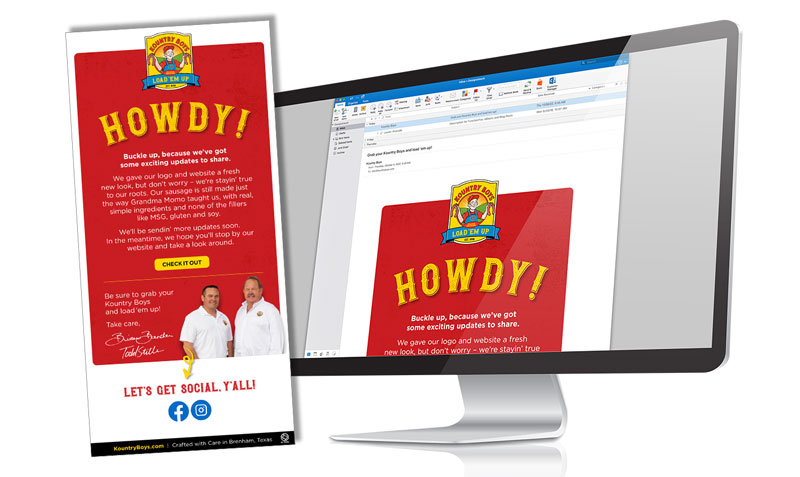BUILD COMMUNITY AND CONNECTION WITH EMAIL MARKETING.

Guide your customers’ journey with expertly crafted email marketing campaigns.

Email marketing is a powerful tool for connecting with your customers. With one of the highest conversion rates of all marketing channels and an impressive ROI — we’re talking 36x return versus spend1 — email marketing campaigns should be front and center in your integrated marketing strategy.
From monthly newsletters to onboarding journeys to limited-time offers, email marketing offers you a ton of ways to build brand loyalty and raise awareness. But whatever direction you’re going, one thing should always remain in focus: providing value to your audience. When you partner with a marketing agency like Design At Work, we help you tackle each step of the process — from strategy to in-depth data analysis — while keeping high-value content at the forefront.

Designing effective
email marketing
campaigns.
From the first step — mapping out your company’s goals — to the last — reviewing data to see what worked and what could be better, email campaign design involves a lot of moving parts. Let’s take a closer look at each of them:
- Strategy. First, you’ll need to define your goals. These will provide a clear direction for the creative content development. For example, a monthly newsletter can be used to highlight company achievements, share industry insights and keep your brand top of mind. On the other hand, a Black Friday email campaign may promote a limited-time offer for your subscribers. This is also the opportunity to think about how the message will be shared across various platforms and how to tailor the content for each channel.
- List building. Next up, who are you sending the email to? While it might be tempting to send every message to everyone on your list, we’re going to stop you right there. It’s important to send high-value content to your subscribers to keep them engaged. Being intentional with your messages — and regularly optimizing your list — boosts your overall authority, deliverability and helps you make more powerful connections with your audience.
- Copywriting. Now that you have identified your goal and audience, it’s time to focus on content creation. What is the overall message that is being shared? You’ll want to share that message in a way that aligns with your company’s brand voice and campaign goals. This includes the big stuff like the headline and main body copy, but it also includes several smaller elements like the subject line, teaser text, personalization and even the sender’s information.
- Design. Next up, what will the email look like? Effective campaign design reinforces the message. It creates visual hierarchy to help readers process information, guiding their attention from the highest priority elements through supporting content. It’s also important to note that each email marketing platform offers specific capabilities — and limitations — that can impact the design. Keeping this in mind, graphic designers find creative solutions to provide clarity and consistency throughout campaigns.
- Landing pages. Where will your customers go after they open your email? Ideally, your emails are a powerful gateway to your site. Landing pages, the specific webpages linked within an email, are the critical last step in an email campaign. Depending on the email marketing campaign, you may direct readers to a recent popular blog on your site or a landing page with a special promo code.
- Analytics. Once you’ve put in all the hard work, you want to see if it paid off! Reviewing campaign analytics helps you assess how successful your campaign was, where to improve and how to continue building off the successes across all platforms. Understanding customer behavior and preferences can help you better communicate and connect with your audience in the future.
Email marketing automation is your friend.
Automation helps you reach the right people at the right time — with the right message. While it takes more time up front to map out your user journey, segment your mailing list and set up the automations, the results pay off. Taking the time to set up intentional automations allows you to create more robust and effective marketing campaigns.
What does email marketing automation look like?
Picture this: A potential customer who wants to learn more about, say, email campaign design is interested in downloading a how-to guide from your website. They share their email so you can send them the guide — and voilà — they receive the guide in a matter of minutes. There’s no team member standing by waiting for potential customers to request the guide. Instead, the email goes out seamlessly as part of a pre-set automation.
This is just one quick and dirty example of how automations can benefit your team. By freeing up your team’s resources so they can focus on everything else, they also provide a positive experience for your customers. If you ask us, that’s a win-win.
Email marketing by the numbers.

- 89% of marketers use email as their #1 lead-generating tool1
- 86% of professionals value and prioritize connection through email2
- 72% of customers prefer email marketing for business-related communication3
- 10% is a good response rate to aim for on average4
- 93% of B2B marketers rely on email marketing to share content5
Ready to build stronger
connections with your customers?
Our email marketing experts can help.
Sources:
- 10 Email Marketing Statistics You Need to Know, Constant Contact
- Segment Your Email List with these Best Practices, Mailgun
- Native Advertising Rises as Consumers Opt Out, HubSpot
- What is a Good or Average Email Response Rate for Email Marketing, Campaign Monitor
- B2B Content Marketing, Content Marketing Institute



